Opinion 10
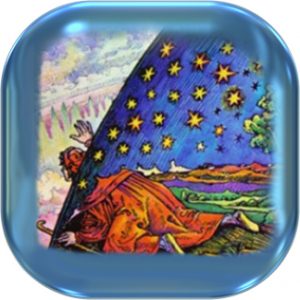
Composite: Part of engraving by Camille Flammarion. 1888.
Button by Image by Gerd Altmann from Pixabay
Abstract
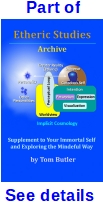 To be lucid is to sense reality as it actually is and not as we have been taught. Lucidity is the clarity of sensing that we develop as we gain discerning intellect. Thus, a seeker after wisdom is one who is becoming more lucid in understanding and perception.
To be lucid is to sense reality as it actually is and not as we have been taught. Lucidity is the clarity of sensing that we develop as we gain discerning intellect. Thus, a seeker after wisdom is one who is becoming more lucid in understanding and perception.
Lucidity is not natural to a person, which is defined here as immortal personality entangled with a human avatar. Human Instincts dominate the relationship unless they are overridden by intention guided by discerning intellect. This is the oldest of ancient wisdom.
The relationship between our immortal self and our human avatar is described in this essay with suggestions for how to become more lucid.
Lucidity is a term that was used in the early 1800s to describe the ability to sense our etheric and physical environment as it is and not as our mind tells us it is. The term is used in the same sense as lucid dreaming or clairvoyance (clear sensing). We are all lucid to some extent, but it is relative so that a good psychic is said to be relatively more lucid than the average person.
Lucidity may be spontaneous or purposeful. The average person is usually not purposefully lucid but does have moments of clarity. Intuition, for instance, is characterized as an unusually lucid moment of awareness.
Increasing lucidity is considered a sign of progress for people who purposefully seek to gain greater discerning intelligence. For instance, mental mediumistic ability is possible because the person, naturally or through personal effort, has learned to experience information emerging from the subconscious more as it is, rather than as it is colored by expectations.
Lucidity is a Phenomenon of Duality
While we can describe our nature from the perspective of our humanness, everything we might say would be based on the assumption that we are our body. However, that perspective ignores the numerous reported experiences and subsequent research that is best explained, not from the organic perspective of Physicalism, but from the etheric perspective of Dualism.
Perhaps that most universal and fundamental of our nonphysical abilities is described in parapsychology as anomalous acquisition of information. The old Spiritualist term for it is clairsentience, meaning clear sensing. In this context, the degree to which one is clear sensing is known as lucidity.
Lucidity is Not a Natural State of Awareness for a Person
When we enter into a lifetime with our human as a person, our discerning intellect and inherited understanding become entangled with our human’s instincts in a shared worldview. Without conscious intervention, our human’s instincts dominate our perception so that we experience life from the perspective of those basic urges. With that in mind, other than occasional of clarity, the average person has little or no purposeful lucidity.
As shown by the dominance curve illustrated in the Temperament Mediated Perception Diagram below, we do gain a little lucidity through everyday experiences. That is called maturing; the wisdom of old age. However, consciously deciding to become a seeker of greater lucidity typically requires more than simple determination. The Enlightenment Threshold in the diagram represents the realization that we are not our body. I will explain the implications of that threshold below.
Here, it is important to understand that our human is not a herd animal. Humans are an apex species better equipped to dominate than to share as they serve their genetic predisposition to assure survival of their genes. If at all, respect for the greater good typically only comes when others are watching.
In our society, we rightly speak of human nature as an excuse for behavior. That makes sense because human nature is a natural part of what we inherit when we entangled with our human for a lifetime. In this essay, I will try to put that relationship into perspective based on seeking discerning intellect.
We are genetically presupposed to seek greater personal power so as to enhance personal gene dominance. It may be true that many instances of apparent altruism can be traced back to this urge to promote the personal gene pool rather than selfless acts of service to others.
A good example of unbridled instincts in action is that moment Trump made fun of a disabled reporter. In the context of the argument that human instincts dominate behavior unless they are overridden, Trump’s action was pure human posturing for supremacy of his gene pool. His minions laughing at his mocking is also pure human gene behavior. By submitting to the dominant human, a subservient human helps to assure his or her genes will be favored over those who do not submit. There is no evidence of discerning intellect in that scene.
Survival Metaphysics
To explain how to develop lucidity, it is first necessary to understand the characteristics of our spiritual anatomy that control lucidity. Metaphysics is the study of fundamental principles of nature. A cosmology is a model that organizes metaphysical implications into a comprehendible model which can be used to predict additional implications. It is a hypothesis.
In Your Immortal Self, I developed an updated version of the survival hypothesis called the Trans-Survival Hypothesis. It is based on current science, parapsychological theory and what we know about both direct and Instrumental TransCommunication (ITC). I refer to it with a Trans- prefix to distinguish it from the more mainstream version.
The Trans-Survival Hypothesis is the Given of the metaphysical model I refer to as the Implicit Cosmology.
The Implicit Cosmology is the model developed to describe our spiritual anatomy and the reality we inhabit based on the assumption of survival. If you accept that you are not your body, but that you are an immortal personality living a lifetime as a person, it is sensible to think of yourself as two people. For this lifetime, you are a person. That is, you are an immortal personality entangled with a human avatar for this lifetime. The Implicit Cosmology model describes that relationship.
The reason this is important to you is that, whether or not the Implicit Cosmology is technically correct, if you accept the evidence of Dualism and survival of personality, the cosmology will serve as a guide for how to further your progression.
Please take a little time to examine the material under the Concepts Tab of ethericstudies.org.
Building Blocks of Who We Are
To seek greater lucidity, we must first understand our nature. Assuming you have taken the time to review the material I recommended above, I will focus here on the most important things you need to understand. Our spiritual anatomy can be considered in four parts or layers.
Part 1: Functional
Our conscious perception is formed in our mostly unconscious mind. The Functional Areas for Perception and Expression Diagram represents our mostly unconscious mind. In it, information is shown coming to us by way of the Attention Limiter. That information could be from one of our human’s senses, a psychic signal from our environment or a thought from other incarnate and discarnate life fields.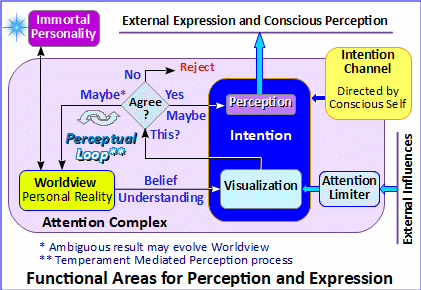
Our intention is our one meaningful input to the perceptual process.
The Perceptual Loop is the key to understanding conscious perception. The Intention functional area generates a representation of incoming information based on how it compares to Worldview. Worldview is like a database containing memory, what we have been taught, and most importantly, our human’s instincts and inclinations impressed by our immortal personality (discerning intellect).
The Attention Complex acts as our Judge because the perceptual loop generates conscious perception based on what we think is true. It is important that you understand this. Your conscious self—your I think I am this—is best thought of as your Experiencer. All of what you think is true, including your local reality, is produced by your Judge based on the past and human and spiritual instincts.
Part 2: Conceptual
Physical space is objective in the sense that we experience it through our human senses and the senses of other life fields. We define it in physical terms such as mass, speed, color and shape. We think of physical things. Our human body has evolved in this physical world to expect things to be physical.
Etheric space, which is the aspect of reality our mind inhabits, is conceptual. This means we experience it as ideas and related concepts. Reality consists of life fields and the expression of life fields. Everywhere is here and movement is by changing perspective.
It is reasonably well documented that the etheric, proposed as the Psi Field in parapsychology, is nonlocal. This means psychically accessed information is available from any physical place. Put another way, there appears to be no distance in the etheric. In principle, a person in New York can psychically access real-time information from San Francisco.
A useful way to think of thoughts is to model them as thoughtforms—etheric fields bound to and representing specific concepts. They are like a gestalt representation of the concept or idea they contain which includes feeling, memory, purpose and understanding. In thinking of a red wagon, for instance, we understand the nature of red wagon as a concept. The representative thoughtform may be a subset of four-wheeled vehicles, which may, in turn, be a subset field of the vehicles field.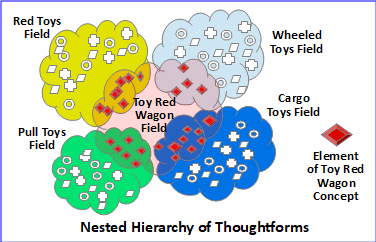
As is illustrated in the Nested Hierarchy of Thoughtforms Diagram, concepts in the etheric tend to be clustered with like concepts. This even applies to organisms. Our human can be modeled as the top life field of a hierarchy of sub-fields such as skin, bone, arm, eye …. Consider Rupert Sheldrake’s Hypothesis of Formative Causation.
In this model, reality consists of life fields and their expression; actually, a nested hierarchy of life fields. A skin cell is a life field with the same qualitative characteristics of the top organism, or of Source (God, if you wish) for that matter. The difference is the extent to which the common characteristics are expressed.
It is important to understand the way we mentally sense information as concepts. When we psychically sense a physical thing, say that red wagon, it appears that we sense it as a set of concepts and not as a solid object. Yes, one of the concepts would be solidness, but that may not be an important attribute for why we are sensing it.
When contemplating how we think, remember this idea that concepts precede objective things. I will talk more about this idea later.
Part 3: Perceptual
Our present sense of what is real is based on our worldview. In effect, our past (memory, lessons) forms our perception of the present. The emphasis here is on how our worldview influences our perception. The old idea of Garbage in- Garbage out applies.
In the Mind as Storyteller essay, I explained how our mind is programmed to explain the world to us. That is, sensed information is not simply brought to our conscious awareness. It is explained to us based on our worldview. That explanation is only a version of actual reality. Please take time to read Mind as Storyteller.
As it is used here, lucidity is the degree to which we are able to sense the actual nature of reality, as opposed to how we have been taught. Lucidity is not an absolute, as in we have it or we do not. Lucidity is not an absolute, as in we have it or we do not. It is shown in the Diagram as a Lucidity Spectrum or continuum from human instinct dominance to advanced discerning intellect.
As it is used here, enlightenment comes as the emergent realization that we are not experiencing our world as it really is. It tends to be an event or milestone in our life. In practice, it usually represents the first step on the Mindful Way. In the Temperament Mediated Perception Diagram, the Enlightenment Threshold represents the moment of enlightenment. Granted, it is likely a gradual awakening, but it does represent a phase change as a person begins to consciously manage how experiences are understood.
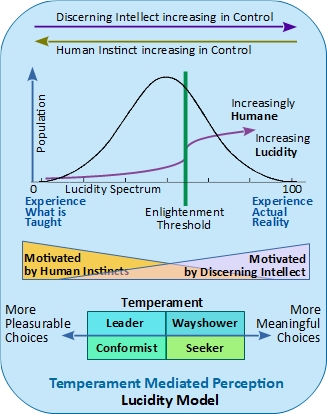
In the same diagram, Increasing Lucidity is shown as a function of a change in perception because of the kind of choices a person makes. It is arguable that we exist to gain understanding, and that we are having a human lifetime so that we can gain understanding about the physical aspect of reality through experiences.
As is discussed below, we seem to exist to gain understanding, but we appear to be having an entangled human lifetime in order to learn how to master human instincts. This concept might be described as Intentional Presence of Mind.
The idea that our purpose is to gain understanding has stood up to a lot of scrutiny, but it has not addressed why we might want to increase our lucidity. Just as we ask what purpose an inherited physical trait has for survival of the species, so we must ask what purpose our urge for increased lucidity serves for our spiritual evolution. In practice, doing so tends to defeat the need for us to spontaneously experience life. Everyone being very lucid would seem to break the physical as a useful venue for learning.
A classic example of this question is the Master and the Seeker Dilemma. If, because of greater lucidity, a master sees that a seeker is about to have a painful experience, should the master warn the seeker away or allow the seeker to have the experience. Which is the most compassionate? Every experience—enjoyable or painful—is an opportunity to gain great understanding. Saving the seeker from the experience would be a form of violation, but would not failure to save the seeker from a painful experience also be a violation?
The question is concerned with the idea that the physical is a venue for learning. A person with great lucidity might defeat that purpose by seeing what the average person would not. Is it cheating to interfere if the information is based on unusual clarity? Ask yourself if you are willing to knowingly be the instrument of someone’s important but painful lesson.
Hyperlucidity is a short-term change in behavior marked by the tendency to find phenomena everywhere despite considerable testimony to the contrary by peers. The concept comes from occasional reports of odd behavior exhibited by some people when they visit an emotionally charged place (Paris syndrome, Jerusalem syndrome) or experience great beauty (Stendhal syndrome). The effect is the experiencer’s mistaken belief in experiencing paranormal phenomena such as reporting voices in recordings when there are none, seeing features in featureless visual media and misattributing thoughts as transcommunication.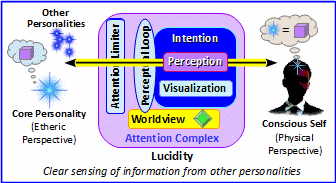
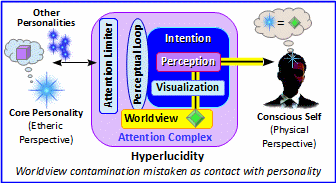
Paranormal phenomena are very subjective, and as I describe in Mind as Storyteller, we too easily fool ourselves into believing something is true that is not. In hyperlucidity, people sometimes think they are experiencing something paranormal when they are not. This is especially a problem in psychic and mediumistic activity.
The antidote for hyperlucidity is education and practiced discernment. If we acknowledge the storyteller effect of our mind, it should be clear that paranormal practitioners would do well to ask friends to provide the occasional uncoached feedback as a sensibility check. Working with a cooperative community and accepting candid feedback is our most important tool for progression.
Part 4: Actionable
If you have read the above and the linked material, and if you understand it, you should be thinking about how to apply it in your daily living. If you do not understand, I am happy to answer your questions. You can contact me via the contact tool at the bottom of each web page. I am also on Facebook. My preference is that you open a conversation on the Idea Exchange so that others can also learn from the conversation.
As an occasional spiritualist healer, I can usually tell when someone sitting in my chair is accepting my healing intention. It is the same with people I am teaching. I know they want to learn. I feel they are trying. I think the problem might be that they do not know how.
An unlikely comparison comes as the way an animal will be irrationally afraid of something like a shadow or something unexpected on the floor. You have probably seen videos of how a pet might be so used to a glass door being closed that it still behaves as if the door is closed, even though it is opened. Animals are guided by a complex set of instinctual behaviors that have evolved to assure that they survive to reproduce. Logic is not a dominant characteristic of animal instincts.
Our human is an animal and is guided by the same sort of instincts. While people are more logical than our pets, their behavior is still mostly some contemporary expression of their instincts intended to assure survival. I am not a psychologist, but it is clear that one of our survival traits is to stick to what we know works. That, I think, is why it is so difficult to change our mind once we have made a decision.
Years ago, I wrote an essay about the winning attitude. In it, I tried to explain that simply deciding to be a winner did not work. Our perception and expression processes are strongly biased toward what we previously thought to be true. Add to that, our human’s instincts push us toward decisions that best benefits its gene pool. Being a good player in the community helps assure that survival. Being a good community player means thinking the way the community thinks. When they say “We are many, but we are one” what they are often saying is that you think the same way we think, or you are not part of the community.
Refer back to the Temperament Mediated Perception Diagram (above). It includes three aspects of becoming lucid. The middle aspect shows opposing wedges representing dominance of instincts on the left and dominance of discerning intellect on the right. The idea is that increasing dominance of discerning intellect leads to increasing lucidity.
Therein lies the key to becoming lucid. While your perception and expression processes are mostly unconscious, and therefore automatic, it is possible to consciously evolve the version of reality your mostly unconscious mind sends to your conscious awareness.
This is not something that you can simply decide to do and then suddenly become lucid. Worldview is very resistant to change. However, by habitually suspending judgment … that is, by consciously deciding to not make a decision about what you think is true, you begin to train your perceptual process to be more open to new thought.
Personal Ethics as a Tool for Becoming Lucid
In the A Personal Code of Ethics for the Mindful Way Essay, I suggested that a useful tool for following the Mindful Way is to adopt a personal code of ethics to consciously seeking to follow. Mine begins with Seth’s “Do not Violate.”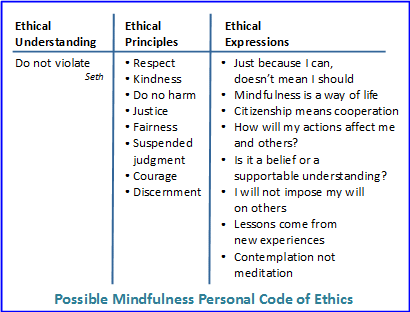
The Ethical Expression Column suggests behavior that will lead to lucidity. Consider “Just because you can, does not mean you should.” By habitually stopping to consider the implications of your actions, you begin to teach your unconscious perceptual processes to pause and wait for the input of your intention. It may sound simple, but the habitual and honest evaluation of actions parts pose substantial a challenge for most of us.
Here are a couple of examples:
Just because I can does not mean I should
In Reno, it is legal to burn wood when there is a “Green” burn code. However, from Residential Wood Burning Can Harm Our Health:
“Wood smoke affects everyone, but people with lung disease, children, older adults, people with cardiovascular disease, and diabetics face greater risk,” said Carrie Nyssen, Vice President of Advocacy and Air Quality for the American Lung Association. “Short-term exposures can affect people with lung disease, causing coughing, wheezing, asthma attacks, acute bronchitis, and may increase susceptibility to respiratory infection. Long-term exposures can lead to reduced lung function, heart attacks, lung cancer, and even premature death, among other health effects.”
In fact, insisting on your right to burn wood is a conscious decision to harm your and other people’s health, as well as the environment. The pleasureful choice is to burn. The meaningful choice is to not burn.
Is it a belief or a supportable understanding?
From Hidden Brain on National Public Radio: Discussing the difference between Liberal and Conservative thinking. 2019.
One of the big implications of all of this work, besides just being interesting in itself, is that it helps us, I think, think about the political conflicts we have with fresh insight. And you’ve made the case that in many ways, the more we are able to see the differences between groups of people as inherent or biological, in some ways, it changes the way we think about those differences.
This is not a political point. The NPR item illustrates that we all have mostly unconscious decision drivers that can be managed with more intended awareness of why we decide as we do. What are the consequences of our actions?
Managing Our Human’s Instincts to Become Lucid
A while back, I woke up in the middle of the night thinking about the idea that we may exist to gain understanding through experience, but we are in this physical lifetime to learn how to manage our avatar’s instincts. That was the beginning of this essay.
We can gain essentially the same understanding about an organizing principle by way of many different kinds of experiences. For instance, we can come to understand the nature of personal responsibility by living as a mechanic or the president of a country. That is probably also true if we were living on the moon or if we were a bird.
The one thing that is unique to this lifetime is that we are entangled with a human and almost completely dominated by our human’s instincts when we begin this lifetime. Nearly every point I make in this essay, be it about how our mostly unconscious mind tells us a story or the difference between lucidity and hyperlucidity, has learning to manage our human’s instincts at the root.
At the same time, it should be clear by now from my writing that increased discerning intellect is possible when we learn to manage our mostly unconscious urges and coloring of perception. Aligning our worldview to better agree with actual reality is fundamental to every seeker’s path I know. Our human’s instincts have not directly distorted our worldview, but they are the indirect cause of every distortion we experience as we try to develop our discriminating intellect.
The maturity of old age comes naturally. Discerning intellect must be worked for every moment of our existence. The most important step you can take toward becoming more discerning is to understand the nature of your spiritual anatomy and make it a moment-to-moment habit of consciously questioning your thoughts, test your assumptions and the implications of your thoughts and decide in favor of your spiritual self rather than your human’s gene ego.
In Summary
Here are the main points I would like you to take from this essay:
- You are not your body. A person is defined in the Implicit Cosmology is an immortal self entangled with a human body in an avatar relationship.
- Human instincts have evolved on this planet to assure the continuation of the human species. They promote survival of the individual’s gene pool over all others, often at the cost of the survival of other people. This inherited self-serving motivation is as easily expressed in a cave as it is in the board room.
- Lucidity is the degree to which we are able to sense the actual nature of reality as opposed to how we have been taught. Hyperlucidity is a short-term change in behavior marked by the tendency to find phenomena everywhere despite considerable testimony to the contrary by peers. Thanks to our storyteller mind, much of what we think is lucidity is actually hyperlucidity.
- Worldview represents what we believe to be true. It acts as a filter coloring our perception to form the way we think our world is rather than as it actually is. Through mindfulness, it is possible to teach our worldview and better align it with the actual nature of reality. That is the objective when seeking discerning intellect.
- Our mind is a storyteller. It is predisposed to explain everything. Even if it does not actually understand, it will make up a story. This storytelling goes on in our sleep, when we experience something, even in our deep trance channeling. As a general rule, if information comes by way of a person, it is only a version of the actual. All paranormal phenomena come to us by way of a person.
- Our perception and expression are formed in our mostly unconscious mind. The process is always colored by worldview which is what we are taught is true. As our Judge, it decides what we think about everything.
- The one conscious influence we have on our Judge is our intention. By always intending to experience reality as it is, we are telling our Judge to be less definite about its decision.
- The way to gain greater lucidity is to intend not to decide if we accept or reject what we experience, but to try experiencing as things are and suspending the decision until later … if ever. Examining the implications of what we think is true requires us to take a moment to think and increases our awareness that we are responsible for our actions, thoughts and beliefs.
- As it is taught in the Katha Upanishad, selecting the pleasureful is our human’s gene-ego choice. Selecting the meaningful is the choice of our discerning intellect.
Ignorance Vortex: Disbelief > Ignored Evidence > Resulting Lack of Research > Only Encounter Antidotal Evidence > Disbelief.
![]()
